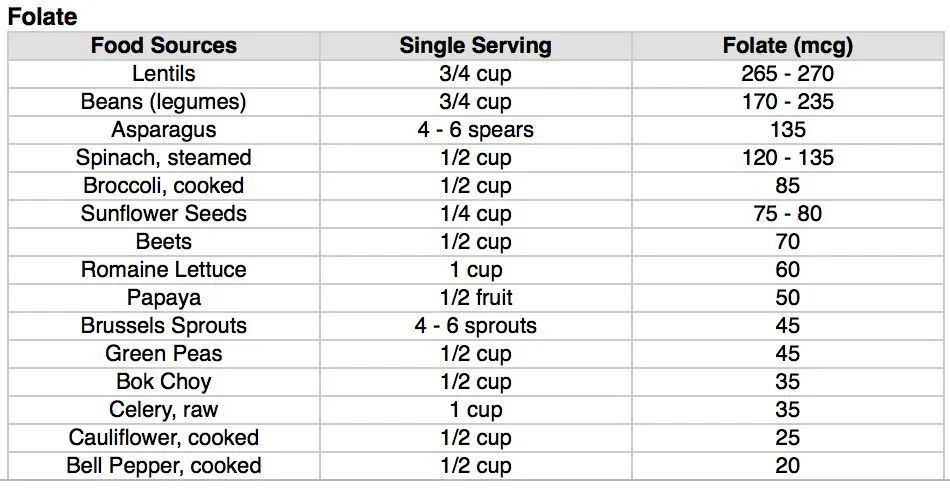Through looking at an essential nutrients role in health and its characteristics of deficiency, one can come to appreciate its value in good nutrition.
Folate Role in Health
Folate is essential for converting food in fuel to produce energy as well help to assimilate fats and proteins. Folate is needed for the making of genetic material (RNA and DNA) for every cell. It helps the nervous system function properly, as well it is needed for a healthy liver, skin, hair and eyes. Folic acid is crucial for proper brain function and plays a role in emotional health.
Folic acid works with vitamin B12 to help make red blood cells and to help iron work properly in the body. Extra folate is also required when pregnant to support healthy foetus development. Folate is water-soluble like all the B vitamins and should be replenished regularly. Getting your folate from food sources is important as folate supplements are not beneficial and can cause other problems.
Characteristics of Folate Deficiency
Folic acid deficiencies are common. Characteristics of the deficiency include poor growth, tongue inflammation, gingivitis, loss of appetite, shortness of breath, diarrhea, irritability, forgetfulness and mental sluggishness. A folic acid deficiency can also cause neural defects in babies.
Deficiencies can be caused by poor appetite, alcoholism, inflammatory bowel disease (IBD) and celiac disease. Certain medications have also been linked to lower folic acid in the body.
Folate Food Sources
The foods that are rich in folic acid include legumes, cruciferous vegetables, dark leafy greens, sunflower seeds and several other types of vegetables.
Nutrient-Rich Whole Food Sources for Folate

This chart lists the best food sources for folate, along with that food source’s single serving size and the amount of folate in that single serving.
The amount of nutrients per serving in the following food sources is not absolute for several reasons. Fresh foods will have a higher vitamin and mineral content when grown in healthier soil, as well vitamin content will deplete a little bit every day from the moment it is harvested. Therefore, these figures should only be used as a generalization.
Folate Daily Intake Recommendations for Child and Adult

These figures are referenced from the Dietary Reference Intake (DRI) 2005 system; used in Canada and the United States. The DRI system provides the minimum daily intake requirements of vitamins, minerals and nutrients for child and adult; males and females.
Written and shared by: J. Marshall from http://nutritionalhealingrecipes.com